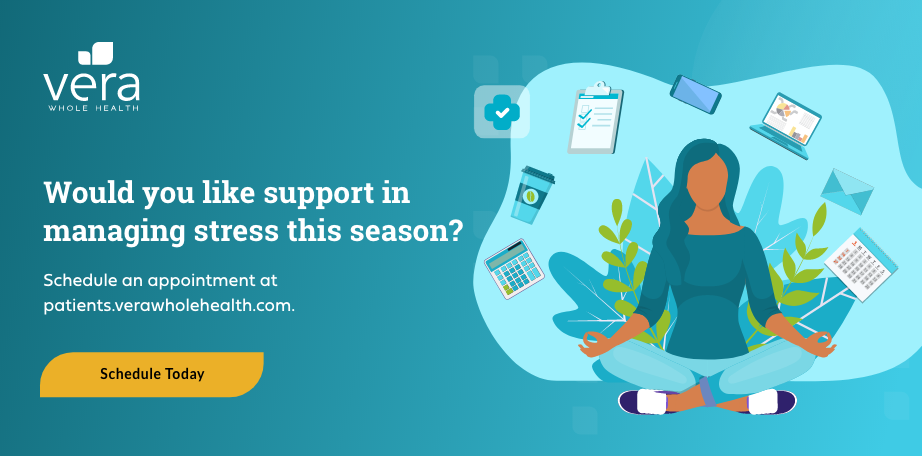Stress is something everyone deals with. Stress can come from our jobs, our homes, our personal relationships, even our health. At times, it can feel overwhelming. And, if left unchecked, it can lead to some pretty serious health issues. The good news is, you can do something about it.
With proper stress management, you can learn to moderate your stress, so it doesn’t take over your life. To find out more about stress management, we chatted with Dr. Marcie Hamrick who teaches stress reduction techniques at the University of Washington. Here’s what she had to say.
Q: What are some common misconceptions about stress?
.png?width=256&name=Vera%20-%20Learn%20To%20Manage%20Stress%20-%20graphic1%20(1).png) Dr. Hamrick: A lot of times, people have a perception that stress is necessarily bad. I think of stress as any change in demands of time or energy for which we need to adjust or change. And that may be for the better. If we didn’t have stress, we would never learn, or grow, or develop new skills, or become a better person. Stress gets a bad rap because it connotes something negative. But if we didn’t get stressed crossing the road, we’d get hit by a bus. It helps us survive, and it helps us grow and thrive.
Dr. Hamrick: A lot of times, people have a perception that stress is necessarily bad. I think of stress as any change in demands of time or energy for which we need to adjust or change. And that may be for the better. If we didn’t have stress, we would never learn, or grow, or develop new skills, or become a better person. Stress gets a bad rap because it connotes something negative. But if we didn’t get stressed crossing the road, we’d get hit by a bus. It helps us survive, and it helps us grow and thrive.
Q: When is stress bad and what are the symptoms?
Dr. Hamrick: We need enough stress to perform well, but we don’t want so much that we have to compensate in other ways, like getting angry or irritable or impatient. Being impatient at work or home is one of the most common symptoms of stress. If it goes unchecked, stress can always manifest itself as constant or excessive worrying, which can lead to anxiety. Or, it might make you feel like you can’t deal with a situation, and make you feel like you want to curl up in the fetal position. That’s when stress can feel more like depression.
Physically, stress can lead to elevated blood pressure, palpitations of the heart, sweating, and difficulty sleeping. Long term, those things can increase the risk for heart disease and even cancer, if the stress is chronic and untreated. Even in the short term, stress can negatively affect our immune system and make us more vulnerable to getting sick.
Q: What is stress management?
 Dr. Hamrick: It’s first recognizing that we’re experiencing stress and then learning ways to take care of ourselves in the midst of it. Over time, we learn to return to behaviors that help us deal with stress and build up our stress resilience. In some cases, it’s about changing our external environment, like adjusting work schedules or saying no to some commitments of time or energy. If we can’t improve the things that give us stress externally, we have to look internally and think of ways to take better care of ourselves.
Dr. Hamrick: It’s first recognizing that we’re experiencing stress and then learning ways to take care of ourselves in the midst of it. Over time, we learn to return to behaviors that help us deal with stress and build up our stress resilience. In some cases, it’s about changing our external environment, like adjusting work schedules or saying no to some commitments of time or energy. If we can’t improve the things that give us stress externally, we have to look internally and think of ways to take better care of ourselves.
Q: What’s the best way to care for yourself when you’re stressed?
Dr. Hamrick: Focus more on exercising, eating well, and getting plenty of sleep. Understandably, that can feel like a really difficult thing to do. Nobody craves broccoli when they’re stressed. They want caffeine and alcohol. But, it’s important to understand that those things have the opposite effect when it comes to helping our bodies and reducing stress.
There are also a lot of relaxation techniques that have been shown to help manage stress. Meditation, breathing exercises, and practicing mindfulness are great examples of useful techniques for minimizing stress.
Q: How can a provider help you with stress management?
 Dr. Hamrick: The first step toward stress management is awareness. Awareness allows you to identify that stress is showing up so you can return to previously successful stress-reduction techniques.
Dr. Hamrick: The first step toward stress management is awareness. Awareness allows you to identify that stress is showing up so you can return to previously successful stress-reduction techniques.
As a provider, I approach it like any other health issue. I ask things like, how long has it been going on? What makes it worse? What makes it better? What was the circumstance that led to your stress? I’ll get that history and then start to ask how things are at home and work. A lot of times, we’re not even sure why we’re stressed. It’s when we’re asked to tease apart various pieces of our lives that it may become more clear.
One question that people raise their eyebrow at is, what do you do that brings you joy? What’s your release? People respond with simple things that involve mindfulness, such as walking the dog, drinking tea on their front porch, or watching the sunrise. What’s great is that these simple joys remind people that they do have times that make them happy. It breaks the story that they’re always feeling stressed and helps them identify things that can help reduce stress when it shows up.
